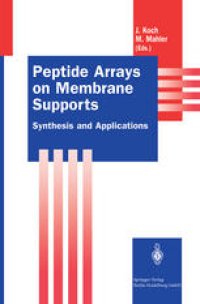
Ebook: Peptide Arrays on Membrane Supports: Synthesis and Applications
- Tags: Biochemistry general, Molecular Medicine, Pharmacology/Toxicology
- Series: Springer Lab Manuals
- Year: 2002
- Publisher: Springer-Verlag Berlin Heidelberg
- Edition: 1
- Language: English
- pdf
Proteins interacting with diverse ligands - proteins, peptides or DNA - are the basic principles underlying many biological processes, such as antigen-antibody binding, signal transduction or receptor binding.
The technique of oligopeptide synthesis on a cellulose membrane and the subsequent binding assays allow the investigation of protein interactions. A particular advantage of these peptide arrays (SPOT - technology) is the high number of oligopeptide probes that can be tested in parallel. Detailed protocols for peptide synthesis, and the analysis of protein-protein, protein-DNA interactions as well as epitope mapping are presented in this manual. It is ideally suited not only for basic research laboratories but also for diagnostic and therapeutic applications since many diseases are related to dysfunctions in protein recognition and binding.
Proteins interacting with diverse ligands - proteins, peptides or DNA - are the basic principles underlying many biological processes, such as antigen-antibody binding, signal transduction or receptor binding.
The technique of oligopeptide synthesis on a cellulose membrane and the subsequent binding assays allow the investigation of protein interactions. A particular advantage of these peptide arrays (SPOT - technology) is the high number of oligopeptide probes that can be tested in parallel. Detailed protocols for peptide synthesis, and the analysis of protein-protein, protein-DNA interactions as well as epitope mapping are presented in this manual. It is ideally suited not only for basic research laboratories but also for diagnostic and therapeutic applications since many diseases are related to dysfunctions in protein recognition and binding.
Proteins interacting with diverse ligands - proteins, peptides or DNA - are the basic principles underlying many biological processes, such as antigen-antibody binding, signal transduction or receptor binding.
The technique of oligopeptide synthesis on a cellulose membrane and the subsequent binding assays allow the investigation of protein interactions. A particular advantage of these peptide arrays (SPOT - technology) is the high number of oligopeptide probes that can be tested in parallel. Detailed protocols for peptide synthesis, and the analysis of protein-protein, protein-DNA interactions as well as epitope mapping are presented in this manual. It is ideally suited not only for basic research laboratories but also for diagnostic and therapeutic applications since many diseases are related to dysfunctions in protein recognition and binding.
Content:
Front Matter....Pages I-X
SPOT Synthesis — Scope of Applications....Pages 1-22
Chemistry of Fmoc Peptide Synthesis on Membranes....Pages 23-39
Manual Peptide Synthesis....Pages 41-53
Automated Synthesis of Solid-Phase Bound Peptides....Pages 55-68
Epitope Mapping of Antibodies with Solid-Phase Oligopeptides....Pages 69-82
Protein-Protein Interactions....Pages 83-96
Analysis of Protein-DNA Interactions....Pages 97-106
Affinity Purification and Competition Assays Using Solid-Phase Oligopeptides....Pages 107-122
Mutational Analysis and Structure Predictions....Pages 123-139
Modification of Immobilized Peptides....Pages 141-151
Immobilized Peptides to Study Protein-Protein Interactions — Potential and Pitfalls....Pages 153-163
Back Matter....Pages 165-173
Proteins interacting with diverse ligands - proteins, peptides or DNA - are the basic principles underlying many biological processes, such as antigen-antibody binding, signal transduction or receptor binding.
The technique of oligopeptide synthesis on a cellulose membrane and the subsequent binding assays allow the investigation of protein interactions. A particular advantage of these peptide arrays (SPOT - technology) is the high number of oligopeptide probes that can be tested in parallel. Detailed protocols for peptide synthesis, and the analysis of protein-protein, protein-DNA interactions as well as epitope mapping are presented in this manual. It is ideally suited not only for basic research laboratories but also for diagnostic and therapeutic applications since many diseases are related to dysfunctions in protein recognition and binding.
Content:
Front Matter....Pages I-X
SPOT Synthesis — Scope of Applications....Pages 1-22
Chemistry of Fmoc Peptide Synthesis on Membranes....Pages 23-39
Manual Peptide Synthesis....Pages 41-53
Automated Synthesis of Solid-Phase Bound Peptides....Pages 55-68
Epitope Mapping of Antibodies with Solid-Phase Oligopeptides....Pages 69-82
Protein-Protein Interactions....Pages 83-96
Analysis of Protein-DNA Interactions....Pages 97-106
Affinity Purification and Competition Assays Using Solid-Phase Oligopeptides....Pages 107-122
Mutational Analysis and Structure Predictions....Pages 123-139
Modification of Immobilized Peptides....Pages 141-151
Immobilized Peptides to Study Protein-Protein Interactions — Potential and Pitfalls....Pages 153-163
Back Matter....Pages 165-173
....